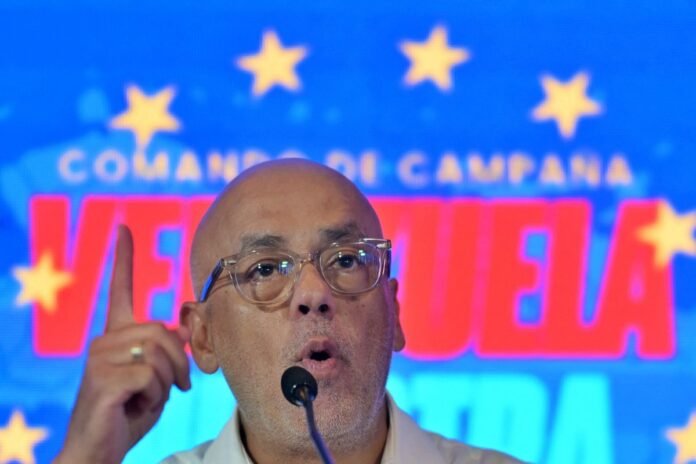Start of a new dialogue between Venezuela and the United States
Washington and Caracas on Wednesday welcomed the resumption of dialogue between the two countries.
Jorge Rodriguez, Venezuelan Chief Negotiator and President of the National Assembly on June 27, 2024 in Caracas.
AFP
Venezuela and the United States resumed dialogue on Wednesday to try to improve their relations despite Washington maintaining sanctions on the Venezuelan oil sector.
“After this first meeting, we agreed on: 1. the desire of the two governments to work together to gain trust and improve relations. 2. to maintain communication in a respectful and constructive manner”, confirmed X Jorge Rodriguez, Venezuelan Chief Negotiator and President of the National Assembly after a “virtual meeting”.
President Nicolas Maduro, who is seeking a third term in presidential elections on July 28, announced on Monday, to everyone’s surprise, the resumption of dialogue with the United States.
White House spokeswoman Karine Jean-Pierre on Wednesday welcomed “this dialogue, and we recognize that democratic change will not be easy and will require serious commitment.” “We therefore remain committed to supporting the will of the Venezuelan people and paving the way for democratic governance through open and inclusive elections. I do not have specific details to share about the diplomatic engagement, but we certainly welcome it in good faith,” she added .
Deputy Secretary of State for Latin America Brian Nichols said earlier Monday that the United States is “always open to dialogue.”
Exchange of prisoners
Caracas and Washington began secret talks last year in Qatar. During these discussions, they agreed to an exchange of prisoners. Washington released Alex Saab, accused of being Nicolas Maduro’s front man, in exchange for the release of 28 prisoners, 10 Americans and 18 Venezuelans imprisoned in Venezuela.
In return, the US eased the oil embargo imposed on the country since 2019 in an attempt to remove from power President Maduro, whose 2018 re-election they did not recognize.
But Washington reimposed sanctions in April, notably after confirmation that Maria Corina Machado, the clear winner of the opposition’s presidential primary, was ineligible.
Venezuela condemned this measure, condemning “the pretension of the United States to monitor, supervise, control and manipulate the Venezuelan oil industry through its illegal policy of imposing coercive measures and licenses”.
Washington also criticized the arrests of opponents, 46 in the last six months according to the NGO Access to Justice, as well as the withdrawal of the invitation to the EU to observe the presidential election.
Interest in standardization
Nicolas Maduro said Monday he wanted “dialogue, understanding, a future for our relations, changes under absolute sovereignty and independence.”
From a diplomatic source, Caracas and its allies, like Washington or the EU, have an interest in normalizing relations between the two countries.
Venezuela is seeking the lifting of sanctions in order to revive its economy devastated by an economic crisis that has seen the country’s GDP fall by 80% in ten years. For their part, Westerners, in a context of tensions over the price of a barrel with the war in Ukraine and events in the Middle East, would welcome Venezuela’s return to the oil market in the medium term.
The country, which once produced more than 3 million barrels a day, struggles to produce just under a million today. In addition, about 7 of the 30 million Venezuelans have fled their country, creating problems or debates about immigration among its neighbors, but also in the United States, exacerbated by the approaching presidential election in November.
“Latest news”
Do you want to be at the forefront of the news? “Tribune de Genève” offers you two meetings a day, directly in your e-mail box. So you don’t miss anything happening in your canton, in Switzerland or around the world.
Other newsletters
AFP
If you have found an error, please report it to us.
